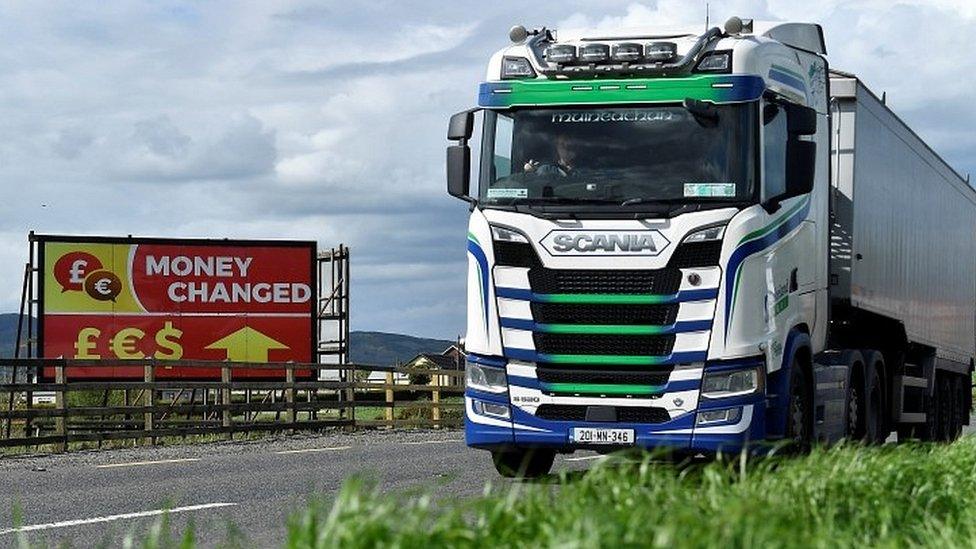NI Protocol: MPs to vote on plans to ditch parts of Brexit deal
- Published
- comments
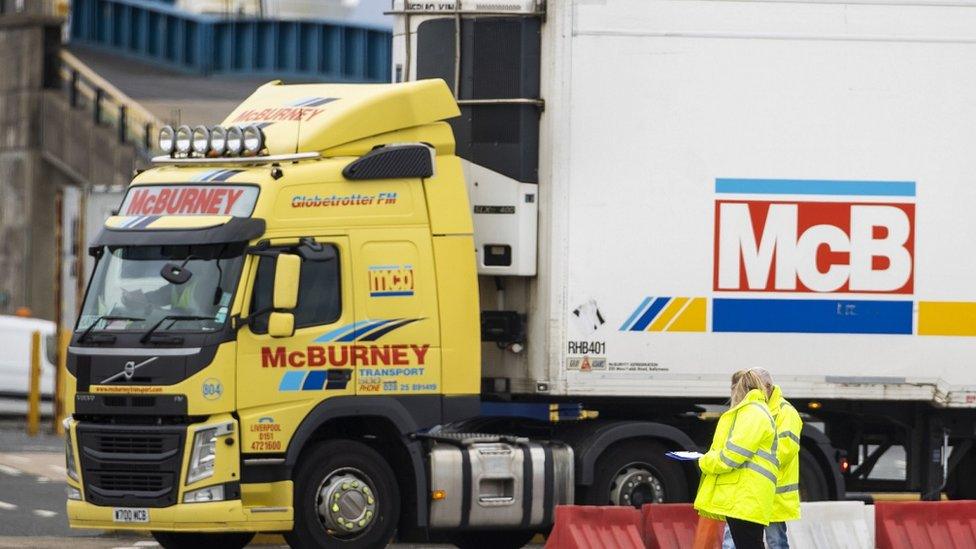
The government wants to change the Northern Ireland Protocol to make it easier for some goods to flow from Great Britain to Northern Ireland
MPs will vote on Monday on new legislation to give ministers the power to scrap parts of the post-Brexit deal between the UK and the EU.
The government wants to change the NI Protocol to make it easier for some goods to flow from Great Britain to Northern Ireland.
Prime Minister Boris Johnson said he believed legislation on the deal could be passed by the end of the year.
The EU opposes the move, saying it breaches international law.
The government is aiming to fast track the protocol bill through the House of Commons before the summer recess in mid July.
It is proposing to condense the committee stage of the legislation across just three days - a process which can sometimes take weeks.
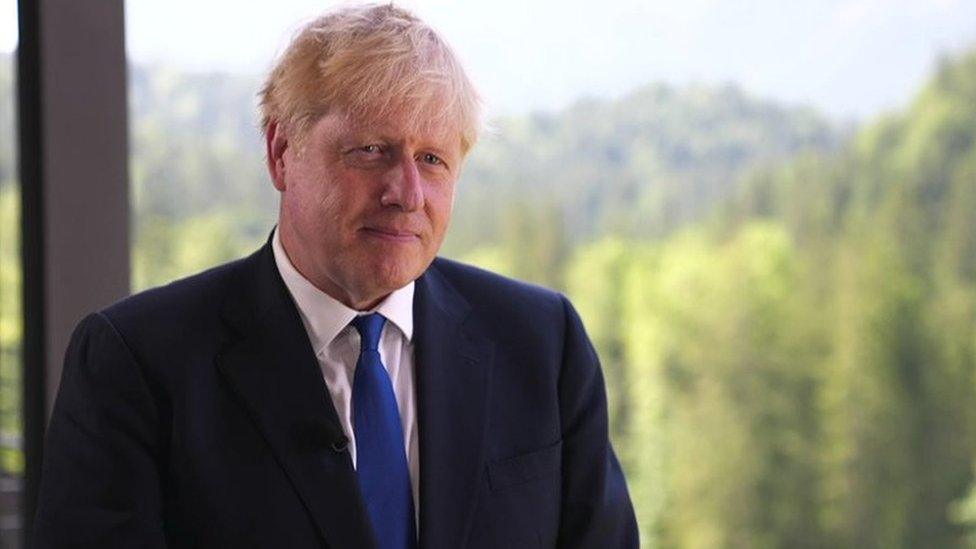
Boris Johnson was asked about the legislation while at a meeting of world leaders in Germany
The protocol is part of the 2019 Brexit deal and keeps Northern Ireland in the EU's single market for goods, preventing a hard border with the Republic of Ireland.
But it means checks on some items which come into Northern Ireland from other parts of the UK, creating a trade border in the Irish Sea.
Speaking to the BBC, the prime minister said its plan could be carried out "fairly rapidly".
"What we are trying to do is fix something that is very important to our country, which is the balance of the Belfast/Good Friday Agreement," Mr Johnson said.
"You have got one tradition, one community, that feels that things really aren't working in a way that they like or understand."
He argued "unnecessary" barriers to trade could be removed without endangering the EU single market.
But the PM said it would be "even better" to agree more flexibility with Brussels.
Irish Foreign Affairs Minister Simon Coveney said the protocol bill was "no fix" and would damage the Good Friday peace deal, rather than protect it.
Allow X content?
This article contains content provided by X. We ask for your permission before anything is loaded, as they may be using cookies and other technologies. You may want to read X’s cookie policy, external and privacy policy, external before accepting. To view this content choose ‘accept and continue’.

Ahead of the vote, Foreign Secretary Liz Truss said the protocol was undermining peace in Northern Ireland.
The government's plans, published earlier in June, faced a fierce backlash from the EU, which launched legal action against the UK government over the legislation.
Mr Šefčovič has also indicated that further measures may follow if the bill proceeds, including a trade war between the UK and EU.
The protocol is opposed by unionists in Northern Ireland who argue it undermines Northern Ireland's place in the UK.
Sinn Féin won the most seats in May's assembly election but the Democratic Unionist Party (DUP), which came second, is refusing to re-enter a power-sharing executive until its concerns about the protocol are addressed.
Ms Truss said on Sunday night that the protocol was undermining the peace and stability secured in Northern Ireland by the Good Friday Agreement.
Three Northern Ireland parties - Sinn Féin, Alliance and the SDLP, who collectively won the most seats in May's election - say the protocol is necessary to mitigate the effects of Brexit in Northern Ireland.
What is in the Northern Ireland Protocol bill?
The UK government published plans for the bill earlier this month. At the centre of the proposal is the concept of green lanes and red lanes for trade.
This would mean:
Goods coming from Great Britain (GB) into Northern Ireland (NI) and which are staying would use the green lane. This means there would be no checks and paperwork would be minimal
GB goods moving through NI into Ireland or the wider European Union would use the red lane and continue to be checked at NI ports
London also wants any trade disputes resolved by "independent arbitration" and not by the European Court of Justice, and for Northern Ireland to benefit from the same tax breaks as elsewhere in the UK.
After a debate on Monday, MPs will then vote on whether the bill can proceed for further consideration.
Labour leader Sir Keir Starmer confirmed his party will vote against the legislation, adding that they would scrap the proposed laws if it was in power.
The prime minister may also face opposition from his backbenches after he overcame a vote of confidence among Conservative MPs earlier in June.


This is another big day at Westminster and one that could expose just how many problems Boris Johnson has with rebels in his own party.
Bruised from the by-election defeats last week, some may seek to punish him further by voting against the bill or abstaining.
However, according to several London sources, a large rebellion is unlikely.
Regardless, it's thought the government wants to push the bill through its remaining Commons stages before summer recess - a move that will spark strong reaction in Belfast and Brussels.
The DUP has welcomed the move but there's still some way to go before it will commit to return to power-sharing government in Northern Ireland.
Other parties, including Sinn Féin, say the bill breaks international law and are urging MPs to vote it down.

DUP leader Sir Jeffrey Donaldson said the party would "consider what steps we can take" if the bill gets through all its Commons stages intact.
"We have made clear that getting decisive action on the protocol, addressing the harm that the protocol is doing to Northern Ireland, is very important to rebuild the cross-community consensus that is essential for power-sharing to work.
"We're already beginning the preparatory working for the restoration of the devolved institutions, but as to when that might happen I've made clear that we will be condition led, not calendar led."
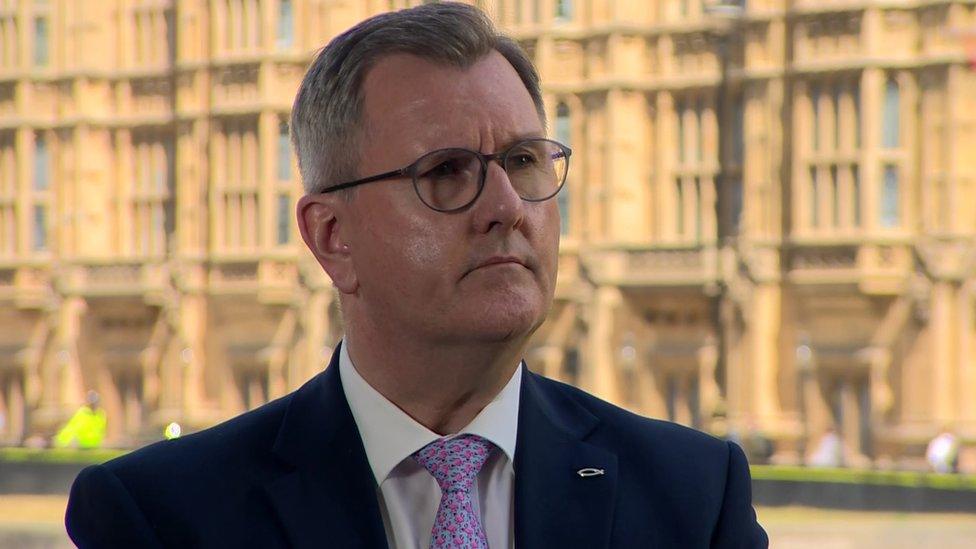
Sir Jeffrey Donaldson said if the bill goes through intact his party would look to respond in terms of restoring the power-sharing executive in Northern Ireland
However, SDLP leader Colum Eastwood said the government was prepared to rip up international law and threaten the stability of the Good Friday Agreement.
"This is a country that is turning into a rogue state," he said.
"This is all about Boris Johnson shoring up the support of the hard right of the Tory Party, this is nothing to do with the DUP or Northern Ireland or even the protocol, it's about Boris Johnson and everything he does is about himself."
In a statement ahead of the vote, Ms Truss said: "This legislation will fix the problems the protocol has created, ensuring that goods can flow freely within the UK, while avoiding a hard border and safeguarding the EU single market.
"A negotiated solution has been and remains our preference, but the EU continues to rule out changing the protocol itself - even though it is patently causing serious problems in Northern Ireland - which therefore means we are obliged to act."
The EU has said it is unwilling to renegotiate the protocol but has offered to work on different aspects of how it is implemented.
Earlier this week, Taoiseach (Irish prime minister) Micheál Martin said the UK government's plans would be "economic vandalism" on Northern Ireland.

What is the Northern Ireland Protocol?
The Northern Ireland Protocol is part of the Brexit deal: it means lorries don't face checkpoints when they go from Northern Ireland (in the UK) to the Republic of Ireland (in the EU)
Instead, when goods arrive in Northern Ireland from the rest of the UK (England, Scotland and Wales), they are checked against EU rules
The UK and the EU chose this arrangement because the Irish border is a sensitive issue due to Northern Ireland's troubled political history
Read more: A simple guide to the Brexit border problem



Related topics
- Published22 June 2022
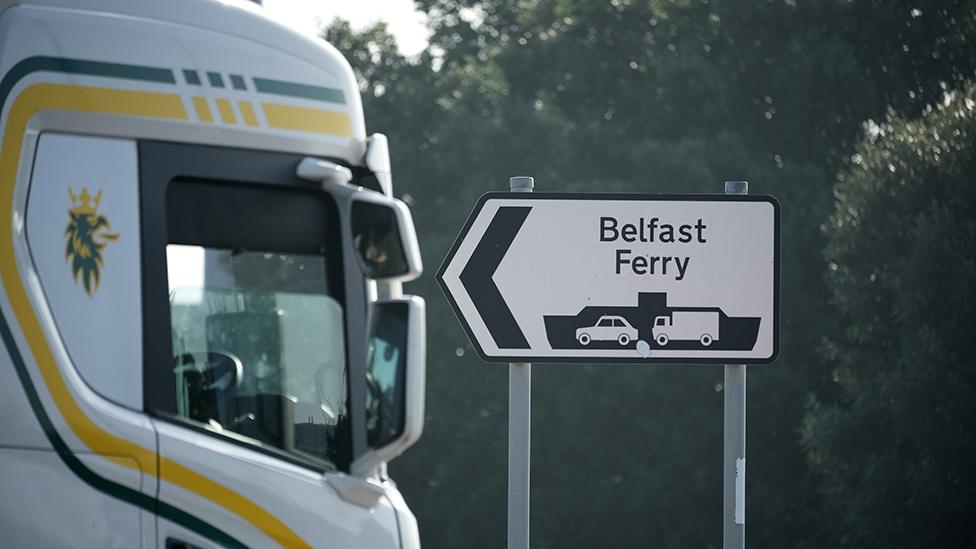
- Published15 June 2022
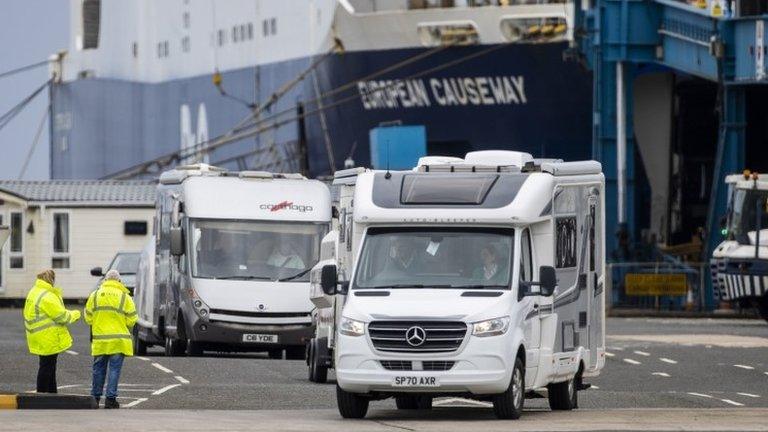
- Published2 February 2024

- Published13 June 2022
